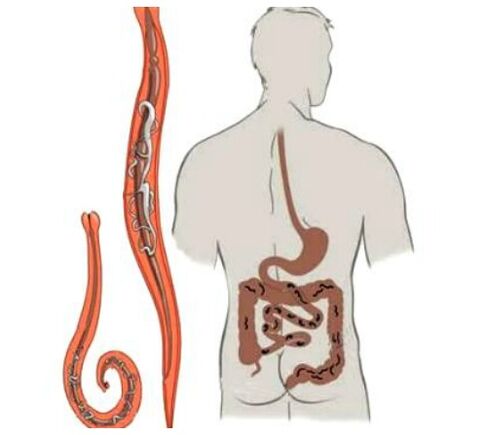The human body is an ideal environment for the habitat of pathogenic microorganisms that can affect almost any organ or system, causing a variety of diseases and disorders. Among such organisms a special place is given to parasites that live and live on cells and other nutrients in the "owner" body. According to medical indicators, approx. 90% of the population of different age categories Carriers of parasites whose treatment and examination are involved in the section of the medicine - parasitology. The term "parasites" means living organisms of different types that have the ability, settlement in the human body, will be introduced into tissues in the internal organs, eating cells, juices or digested foods. Foreign organisms can penetrate any part of our body and live in it for a long time or through a person's life. Some types of parasites in the human body do not cause special changes, but there are those who are capable of negatively affecting the well of the "host" and causing the development of some serious illnesses. In such cases, we are talking about parasitic diseases that require immediate treatment. In medicine, parasites are called all pathogenic organisms that lead a parasitic lifestyle of the human body. These include a variety of bacteria, viruses, fungi and worms, simple, single -celled, arthropods, protozoal invasions and other species.
What are parasitic diseases?

Parasitic diseases (invasions) are a large group of diseases caused by a number of pathogenic organisms that live and multiply inside a person. There are about 300 types of parasites that can affect the human body. Parasitic diseases can be caused by both pathogenic bacteria and parasitic protozoa, arthropods, encellular and other parasites or viruses. The list of parasites in the human body is quite large, but regardless of the type, almost all of them release toxins that destroy cellular structures, damage the internal organs, penetrate the lymphatic flow, blood that poison the body and interfere with the work of internal organs and systems.
Basically consumes pathogenic organisms nutrients that a person receives with food. Perhaps this behavior of "uninvited guests" explains that many people who carry the right lifestyle monitor their health and food do not get the desired result as these "Darmists" remove all the best, leaving a person only a small particle of useful drugs. These beings are so cunning that they are often disguised as other diseases, and a person can walk around the doctors for years, but do not notice a positive result in treatment.
How does parasites fall into the human body?
Foreign organisms can penetrate the human body in several ways, but most often the infection occurs through:
- Water or soil infected with worms.
- Foods that have not passed the desired treatment: poorly fried meat, fish, dirty vegetables, fruits, dairy products.
- Contact with domestic or homeless animals.
- Insect bites.
- Failure to comply with personal hygiene rules.
- Close contact with the carrier of parasites.
Many parasites living in the human body do not have a nervous, cardiovascular or respiratory system, but their reproductive organs are capable of throwing hundreds of thousands of mature eggs into the environment. Eggs and larvae of parasites are very stable, they can be in the soil, water, food or personal objects for a long time. For example, tapeworm walls are able to withstand minus 15 degrees and maintain their important activity for 9 months. Almost all parasites have such protective mechanisms that cannot recognize and destroy the human body. Therefore, many parasitic diseases are difficult to diagnose. Pathogenic organisms can be in both the gut and in the lungs, blood, liver, joint, brain and even eyes. The site of localization of pathogenic organisms depends on their type and other features, both a person and the parasite themselves.
Parasites that live in the body distinguish substances that help them live in a person for many years. They do not have a digestive system, yet parasites use only beneficial substances that come into the human body that allow them to live for many years, while a person slowly loses his health and does not suspect the true reason.
Special organisms, to adapt to new conditions, use their "devices": pointed hooks, plates strikes, hard hair, suction cups that constantly damage mucous membranes of organs. The parasites themselves may have a length of several millimeters to several meters, they also have the ability to excrete different toxins that poison the body as a whole that not only cause disorders in the work of internal organs, but also suppress the immunity, destroy the beneficial bacteria in the gastrointestinal tract and overload the liver with their waste.
Signs and symptoms of parasites in the body

Parasites in the body - symptoms of their presence may be absent or resemble clinical manifestations of other diseases. For example, larvae in the lungs, symptoms of pneumonia, pinworms - cause an attack of appendicitis and parasites - the gall of the bile duct or an attack of pancreatitis.
In addition, parasitic diseases are capable of frequent colds, sore throat, bronchitis and other diseases. You may suspect the presence of parasites in the human body according to the following symptoms:
- Disorders of the work in the stomach -intestinal tract: diarrhea, flatulence, frequent constipation, irritable bowel syndrome
- Joints and muscle pain
- Allergic skin reactions
- Anemia: Many "Co -residents" live by blood, leading to the development of iron deficiency anemia
- Decrease or increase in body weight
- Violation of the work of psyche. Toxins that separate parasites have a destructive effect on the nervous system, causing a person increased irritability, nervousness, frequent depression, panic attacks and other disorders
- Brooksmism - Tooth Rattle in A Dream
- Intestinal dysbiosis
- Violation of the work of the immune system. Many worms and parasites reduce the production of immunoglobulin A, which over time leads to a decrease in immunity. A person is completely defenseless before viral and infectious diseases
- Respiratory inflammatory processes
- Oncological diseases. Long -Term to find the parasite in the body causes a marked decrease in immunity and degeneration of epithelial cells in cancer
In addition to the above symptoms, parasitic invasions often harm the liver, kidneys and the cardiovascular system, leading to a violation of their work and the development of many diseases that are difficult to provide treatment. It is important to note that all of the above signs of parasites in the human body are not an accurate confirmation of their presence. Only professional and high quality diagnosis will help determine the presence or absence of "uninvited guests".
How to recognize a parasitic disease
It is quite difficult to diagnose the presence of Helminths, especially immediately after infection. Until recently, the only way to identify "stranger" was the duodenely sound and analysis of faeces. The results of such studies made it possible to determine fragments, larvae or eggs of parasites. However, such methods did not always produce reliable results. Currently, modern techniques are used to detect parasites that allow you to identify almost any parasite.
- Calais -Analysis (performed at least 3 times)
- Immunoform analysis (ELISA)
- Elisa -Test
- Serological research methods
- Ultrasound examination of internal organs (ultrasound)
- Computed tomography
- PCR -Diagnostics offer analysis of parasites based on DNA -Analysis
The research results not only allow for determining the presence of parasites in the body, but also to evaluate the condition of the internal organs and identify other diseases or disorders.
Treatment of parasitic diseases
The treatment of parasitic diseases depends on many factors: a specific type, its size, quantity, patient's age, body weight and other features. A large range of drugs against parasites are found in the pharmaceutical market, but not all drugs are able to overcome a particular parasite. It is important to note that almost all parasites violate the work of internal organs, so that the patient must be prescribed extensive treatment, which will not only be directed at the destruction of invasion, but also to restoration of the damaged internal organ.
In addition to synthetic drugs, antibiotic, against worms, antiparasitic agents are used that contain natural components to treat parasites. Such agents have no contraindications and are well tolerated by the human body.
Only a physician should treat parasitic diseases according to the results of research and determination of the pathogenic organism. The course of treatment, doses and names of drugs is prescribed individually for each patient. All antiparasitic drugs have a large number of contraindications and side effects, so you need a doctor's consultation before their use.
Important in the treatment of parasites is the use of medications that restore the functionality of the gastrointestinal tract, liver, kidneys, help stimulate immunity, give the body vitamin preparations. No less than the most important thing in the treatment of parasitic diseases is considered proper nutrition. Patients need to exclude their diets with meat and dairy products as they are an ideal environment for propagation of parasites. It is also necessary to exclude the use of sugar, candy completely. Nutrition should be balanced, high quality and useful for the body.
The prognosis after the treatment of parasitic diseases is basically favorable, but in the case of large parasites in large sizes that reside in the body or significant damage to the internal organs, it is difficult to predict the result after treatment.
Prevention of parasitic diseases

You can protect yourself from penetration of parasites, but only in case if you observe simple rules. Prevention of parasites in a person's body lies in:
- Compliance with personal hygiene rules
- Lack of contact with homeless animals
- Avoid children close to pets
- Playing with a child on the street to make sure he doesn't choose different things
- After playing in the sandbox, remember to wash your hands
- Don't eat on the street during hiking on the street, only after their hands were washed
- Regular cleaning of the house
- Use only washed and treated vegetables, fruits
- Eat only good -frated meat
- Drink only boiled water
- If an animal needs the whole family in the house once every 6 months to prevent parasitic diseases.
Compliance with simple preventive rules allows you to protect against infection with parasites and thereby protect yourself and your family from possible disorders in the work of internal organs, which are so often manifested on the basis of parasitic diseases.
















































